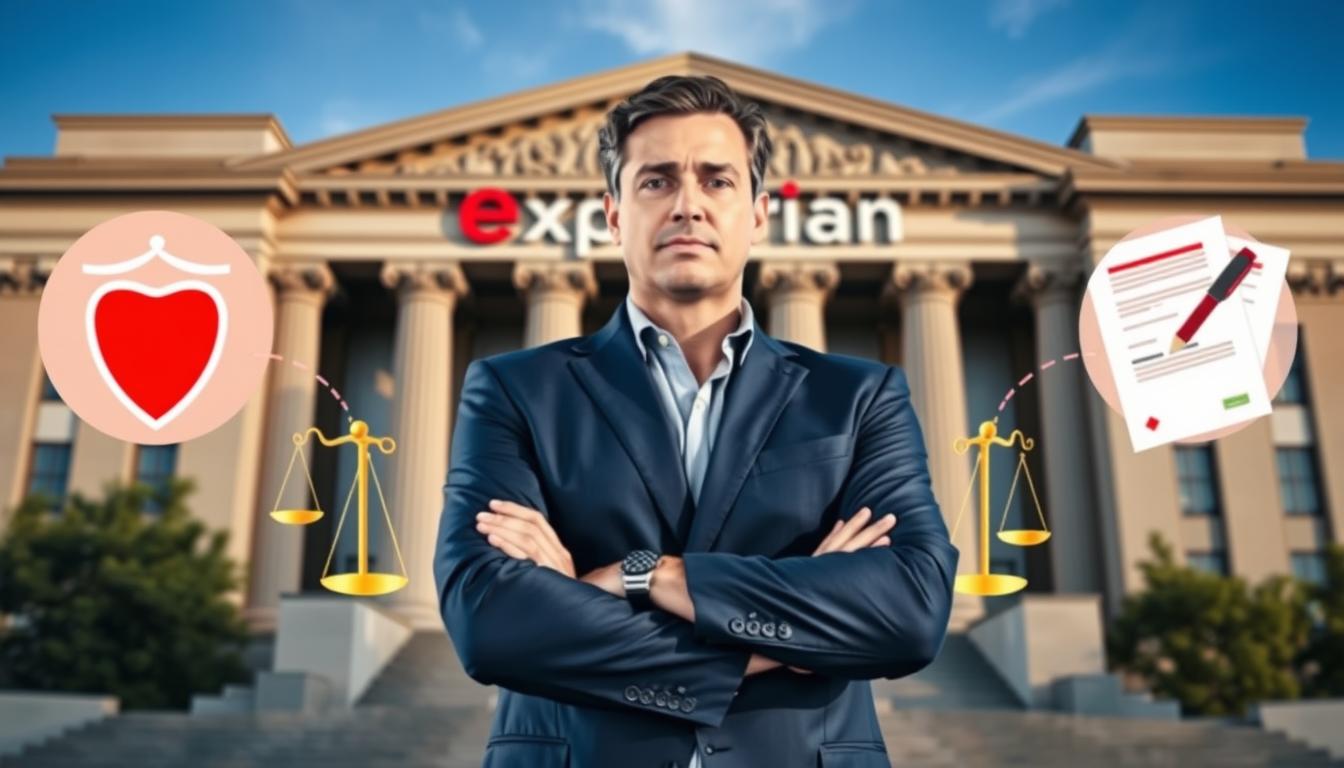Credit report errors can be frustrating. But you can take legal action against Experian, a major credit reporting agency. This guide shows you how to sue Experian for credit report mistakes.
You’ll learn to protect your finances and fix your credit standing. We’ll cover the steps to successfully challenge Experian’s inaccuracies.
Key Takeaways
- Understand your rights under the Fair Credit Reporting Act (FCRA) to dispute and correct credit report errors.
- Identify valid grounds for suing Experian, such as negligence, willful noncompliance, or failure to investigate disputes.
- Learn the process of filing a complaint with the Consumer Financial Protection Bureau and gathering evidence for a lawsuit.
- Explore the benefits and drawbacks of hiring an attorney to represent you in a credit dispute lawsuit against Experian.
- Discover how to effectively navigate the legal system and hold Experian accountable for their actions.
Understanding Your Rights Against Experian
The Fair Credit Reporting Act (FCRA) protects your financial well-being. It ensures accuracy in your credit reports from agencies like Experian. You have the power to safeguard your financial health.
The Fair Credit Reporting Act: A Legal Safeguard
The FCRA sets rules for credit reporting agencies, lenders, and consumers. It requires credit bureaus to keep accurate and complete reports. You can dispute any errors in your Experian credit file.
Grounds for Suing Experian
You may sue Experian if they break FCRA rules. Common reasons include:
- Failure to investigate disputes in a timely and thorough manner
- Reporting inaccurate or incomplete information on your credit report
- Willful noncompliance with the FCRA, resulting in tangible harm to your financial well-being
Knowing your rights helps you hold Experian accountable. The FCRA gives you tools to protect your credit profile. You can address any experian credit bureau complaints effectively.
Learn about the FCRA to defend your experian consumer rights. Take action to keep your credit report accurate and fair.
Experian Credit Report Errors: A Common Issue
Credit report errors can seriously impact your financial health. Experian credit report errors are a widespread problem affecting many consumers. These mistakes can range from wrong personal info to incorrect account details.
Such errors can harm your experian credit score. They make it harder to get loans, credit cards, or even rent apartments. A Federal Trade Commission study found that one in five consumers had an error on at least one of their credit reports.
These errors can stem from data mix-ups, clerical mistakes, or fraud. The effects can be far-reaching. They impact your credit access, interest rates, and overall financial health.
If you find experian credit report errors, act fast. Dispute these errors with Experian and other credit bureaus. This step is crucial for maintaining an accurate credit report.
Know your rights and legal options. This knowledge helps you hold Experian accountable and protect your credit standing.
“Inaccurate credit reports can have devastating effects on a consumer’s financial life. It is essential that consumers take proactive steps to ensure the information in their credit files is accurate and up-to-date.”
The frequency of experian credit report errors highlights the need for regular credit report checks. Stay informed and take steps to fix any issues you find.
By doing so, you can safeguard your credit and financial well-being for years to come.
The Process of Suing Experian
Legal action against Experian can be complex. Understanding key steps can help you navigate it effectively. Filing a complaint with the Consumer Financial Protection Bureau (CFPB) is crucial.
Filing a Complaint with the Consumer Financial Protection Bureau
Start by filing a complaint with the CFPB. This documents your concerns and allows Experian to address the issue. Submit your complaint through the CFPB’s online portal.
Provide details about the experian credit dispute and any planned experian legal action. This step is essential before starting a lawsuit.
Gathering Evidence and Documentation
Strong evidence is key to successful legal action against Experian. Gather copies of your credit reports and correspondence with Experian. Include any documents related to inaccuracies or issues you’ve faced.
Organize your information clearly and concisely. This can significantly strengthen your claim against Experian.
| Step | Description |
|---|---|
| 1. File a CFPB Complaint | Document your concerns and give Experian a chance to address the issue directly. |
| 2. Gather Evidence | Collect copies of your credit reports, correspondence with Experian, and any other relevant documentation. |
| 3. Prepare Your Case | Organize your evidence and documentation to build a strong and compelling legal claim. |
These steps can boost your chances of successful experian legal action. They help protect your rights as a consumer.
Experian Credit Dispute Resolution: An Alternative Approach
Errors in your Experian credit report can be frustrating. The credit dispute process offers a solution without legal action. This method lets you address inaccuracies directly with Experian, saving time and money.
Initiating a Credit Dispute with Experian
Start by reviewing your credit report carefully. Look for errors in personal info, account details, or unauthorized inquiries. Document these issues for your dispute.
You can start an Experian credit dispute in three ways. Use their online form, send a letter by mail, or call customer service.
- Online: Visit Experian’s website and complete their online dispute form, providing the necessary details and supporting documentation.
- By mail: Draft a dispute letter and send it to Experian’s address for credit report disputes, along with copies of any relevant documents.
- By phone: Call Experian’s customer service line and request a credit dispute over the phone, making sure to follow up with any required paperwork.
Experian must investigate your dispute within 30 days. They’ll review your info and check the accuracy of disputed items.

If Experian finds an inaccuracy, they’ll update your report promptly. This can boost your Experian credit score. It may also remove the need for legal action.
Hiring an Attorney: Weighing the Pros and Cons
Deciding to hire an attorney for an Experian lawsuit can be tricky. Legal representation offers expertise, but it’s crucial to consider the pros and cons. Let’s explore key factors when deciding on a lawyer for your experian lawsuit or experian credit score lawsuit.
The Benefits of Legal Representation
- Expertise in navigating the legal system: Attorneys specializing in consumer credit law have a deep understanding of the Fair Credit Reporting Act (FCRA) and the intricacies of filing a successful lawsuit against Experian.
- Stronger negotiating power: Lawyers can often negotiate more favorable settlements or better outcomes in court, leveraging their experience and legal expertise.
- Increased likelihood of success: Studies have shown that individuals represented by attorneys are more likely to succeed in their cases against credit bureaus like Experian.
The Drawbacks of Hiring an Attorney
- Increased costs: Legal representation can be expensive, with attorneys typically charging hourly rates or taking a percentage of any settlement or judgment.
- Time-consuming process: Lawsuits can be lengthy and require a significant investment of time and effort, which may be a deterrent for some individuals.
- Potential for conflicts of interest: It’s important to carefully vet any attorney you consider hiring to ensure they have your best interests in mind and are not primarily focused on their own fees.
Your choice to hire an attorney depends on your situation and case complexity. Consider your goals and resources carefully. Weigh the pros and cons to make an informed decision.
Successful legal action against Experian requires thorough preparation. Know your rights and options clearly. Explore all available resources and seek professional guidance.
This approach can boost your confidence and improve your chances of a favorable outcome.
How to Sue Experian: Step-by-Step Guide
Experian’s credit reporting errors can cause financial harm. If you’re a victim, you may have the right to sue them. Suing Experian can be complex, but following these steps can help you seek justice.
Drafting Your Lawsuit
Start by drafting your lawsuit. Outline the grounds for your case, including specific credit reporting errors or damages. Your lawsuit should clearly state your situation.
Include the nature of the error or financial harm you experienced. Specify which Fair Credit Reporting Act provisions Experian violated. List the monetary damages you’re seeking and provide supporting evidence.
Filing Your Lawsuit in Court
Next, file your lawsuit in the appropriate court. You may need to file in state or federal court. Familiarize yourself with local rules and regulations.
After filing, Experian will receive court documents and can respond. This stage can get complex. Consider seeking guidance from an experienced consumer credit law attorney.

Suing Experian can be challenging and time-consuming. However, it may be worthwhile if you’ve suffered from their negligence. Taking these steps can help protect your rights and potentially recover compensation.
Experian Credit Score Lawsuits: The Impact on Your Credit
Suing Experian can affect your credit score and financial standing. Understanding the legal process is key before taking action. It’s vital to know how it impacts your credit health.
Filing a lawsuit against Experian may temporarily lower your credit score. Experian might flag your credit file during litigation. This could be seen as a risk factor.
A successful lawsuit can positively impact your credit long-term. If Experian violated the Fair Credit Reporting Act, they may need to fix errors. This can boost your credit score over time.
Winning a lawsuit can deter Experian and other credit bureaus. It encourages them to maintain accurate reports and respond to disputes promptly. This benefits both the filer and other consumers.
| Potential Impact on Credit Score | Timeframe |
|---|---|
| Temporary drop in credit score due to the lawsuit | During the litigation process |
| Improvement in credit score if the lawsuit is successful and errors are corrected | After the successful resolution of the lawsuit |
Consider the risks and benefits before suing Experian. Seek advice from a consumer credit law expert. They can guide you through the process and explain potential impacts.
“A successful lawsuit against Experian can lead to the correction of inaccuracies in your credit report, ultimately improving your credit score over time.”
Consumer Rights: Protecting Yourself Against Credit Bureaus
Understanding your rights is key when dealing with credit bureaus like Experian. The Fair Credit Reporting Act (FCRA) empowers you to tackle inaccuracies in your credit reports.
Understanding the Fair Credit Reporting Act (FCRA)
The FCRA is a federal law that oversees consumer credit information. It outlines the rights and duties of credit bureaus and consumers.
Learning about the FCRA helps you navigate experian consumer rights and address experian credit bureau complaints effectively.
The FCRA grants consumers several important rights. These include free yearly access to credit reports from major bureaus.
- The right to access their credit reports from each of the three major credit bureaus (Experian, Equifax, and TransUnion) once per year for free.
- The right to dispute inaccurate or incomplete information on their credit reports and have it corrected in a timely manner.
- The right to be informed when their credit report has been used for adverse actions, such as the denial of credit or employment.
- The right to be notified if information in their credit report has been used to determine their eligibility for certain offers, like insurance or credit.
Knowing these rights helps you guard against experian credit bureau complaints. It also ensures your credit information stays accurate.

“The FCRA is a powerful tool that empowers consumers to take control of their credit information and hold credit bureaus accountable for their actions.”
Experian Credit Bureau Complaints: When to Escalate
Experian credit bureau complaints can be frustrating. You have the right to dispute errors on your credit report. If Experian doesn’t resolve the issue, it’s time to take action.
Filing a complaint with the Consumer Financial Protection Bureau (CFPB) is effective. The CFPB protects consumer rights and can investigate your complaint. They can require Experian to respond and address the issue.
- Gather all relevant documentation, including copies of your credit report, any correspondence with Experian, and any evidence supporting your complaint.
- Visit the CFPB’s website and file your complaint, providing detailed information about the issue and the steps you’ve taken to resolve it.
- Be patient and persistent. The CFPB will investigate your complaint and work with Experian to find a resolution.
Sometimes, the CFPB’s help may not be enough. In these cases, consider legal action. An attorney specializing in credit reporting disputes can guide you.
| Reason to Escalate Experian Complaint | Recommended Action |
|---|---|
| Experian fails to respond to your dispute within the required 30-day timeframe | File a complaint with the CFPB |
| Experian denies your dispute without providing a valid explanation | File a complaint with the CFPB and consider seeking legal advice |
| Experian repeatedly fails to update or correct inaccurate information on your credit report | File a complaint with the CFPB and consider pursuing legal action |
Take experian credit bureau complaints seriously. Know your rights and be proactive. This helps protect your credit and financial well-being.
Experian Credit File Disputes: Resolving Inaccuracies
Errors in your Experian credit file can hurt your finances. The Fair Credit Reporting Act allows you to challenge these mistakes. This right helps protect your experian credit file from inaccuracies.
Documenting Your Credit File Dispute
To dispute errors in your Experian credit file, you need good records. Here’s how to make sure your dispute gets handled properly:
- Carefully review your Experian credit report to identify any errors or inaccuracies.
- Gather supporting evidence, such as payment records, correspondence with creditors, or identity verification documents.
- Draft a detailed dispute letter, clearly outlining the specific inaccuracies and providing the supporting documentation.
- Submit your dispute directly to Experian, either online, by mail, or through the Experian mobile app.
- Keep a record of your dispute, including the date of submission and any reference numbers provided.
Experian must look into your dispute within 30 days. This is the law. Good documentation helps remove wrong info from your experian credit file.

Proactively addressing inaccuracies in your Experian credit file is a crucial step in maintaining a healthy financial profile and protecting your credit history.
Experian Credit Repair: Rebuilding Your Credit After a Lawsuit
Winning a lawsuit against Experian is a big step towards financial recovery. Rebuilding your credit is crucial for regaining financial stability. With the right strategies, you can improve your credit score and reclaim financial health.
Focus on fixing errors in your Experian credit report. Work with the credit bureau to remove lawsuit-related negative items. This helps establish a clean credit history and opens doors for future opportunities.
Use credit-building techniques like secured credit cards and authorized user arrangements. Practice responsible credit use to gradually raise your score. This shows your commitment to good financial management.
Monitor your credit reports often. Address any new issues quickly to keep your progress on track. These steps will help you rebuild your credit and secure your financial future.

